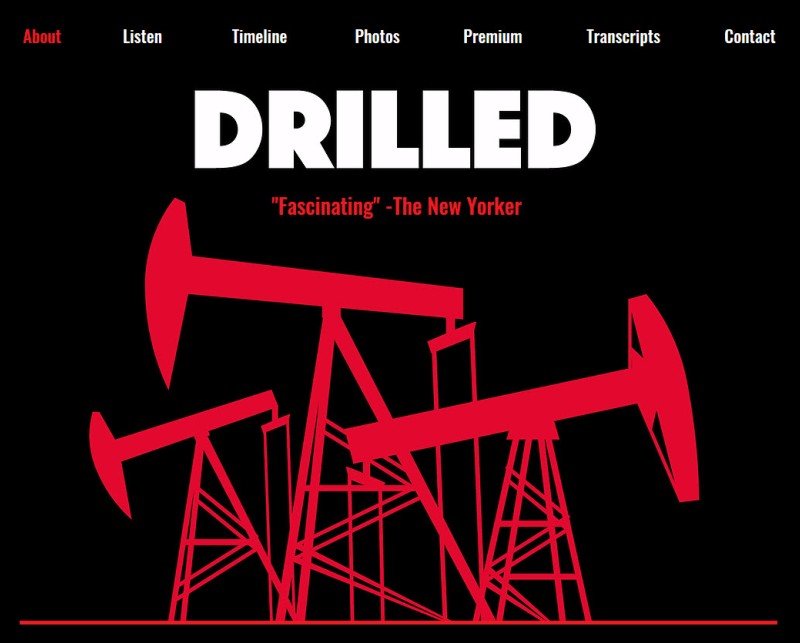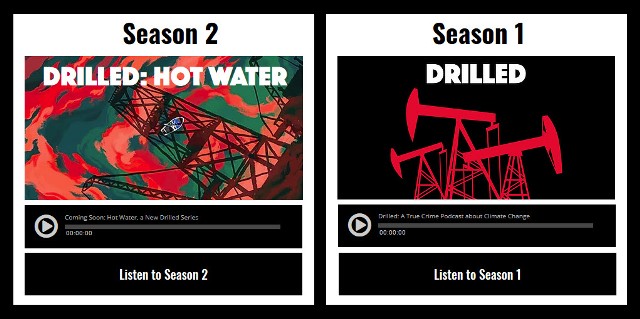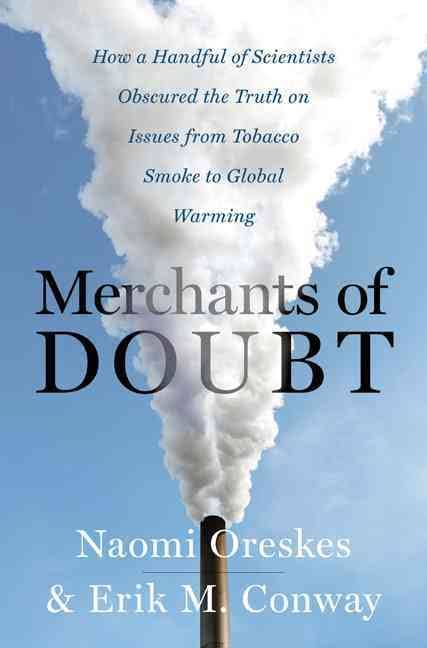Merchants of Doubt
A Global Battle between Climate Science and Climate Science Deniers
An existential struggle, life on earth is at stake
Some say 'not to worry, some say 'worry, really worry'
'Losing Earth' Explores How Oil Industry Played Politics With The Planet's Fate
Climate change is often thought of as a partisan issue in the United States, but New York Times journalist Nathaniel Rich says that wasn't always the case.
Rich says that from 1979 until 1989, climate change was viewed as a bipartisan problem — then the the oil industry "descended and bared its fangs" and everything changed.
Via Fresh Air - NPR
In his new book, Losing Earth, Rich writes that in the late 1980s, the American Petroleum Institute began paying scientists to write op-eds questioning climate science. He describes the effort as a campaign to "sow propaganda [and] disinformation, to buy off politicians and scientists, and, ultimately, to convert an entire political party to denialism."
Rich says the campaign paid off. No longer was climate science accepted as fact: "All of a sudden," he says, "you have a number of pieces that start to appear that say maybe there's not scientific consensus about this problem."
As a result, the Republican party began to shift its stance on climate change: "It's become a starkly partisan issue," Rich says. "And it seems like we are much further from a solution than we were 30 years ago..."
"Losing Earth" ... How the Oil Industry Played Politics With The Planet's Fate
Transcript of the Interview by Terry Gross with Nathaniel Rich
A Global Response to a Global Threat -- the Global Green New Deal
Via Yale Environment 360 / “We have struck a chord that is resonating with the American people, especially young people. And we’re ready for a fight.”
e360 / Elizabeth Kolbert: So the Green New Deal is obviously a resolution and not a piece of legislation. But is anyone working on a legislative package?
Senator Markey: Yes, that’s what we’re saying — that in each area now, we are calling on members of the House and Senate to introduce their bill. So for example, there is a tax-extender bill, which will potentially be up for debate this year that will include extenders for wind tax breaks, solar tax breaks, electric vehicle tax breaks, tax breaks for storage technologies. And that’s the forum to have that debate.
Each committee in the House and Senate, each member now has an ability to introduce legislation that can deal with the issue. So we’re having hearings.
And what people forget is that Citizens United was decided [by the U.S. Supreme Court] in January of 2010. And that’s what led to a flood of money coming into the system in 2010, and that dropped the overall public acceptance that climate change is real by 20 points. So we’re now back up to 72, 73 percent [who accept the reality of climate change]. And we have a Green New Deal movement that’s been born.
• https://e360.yale.edu/features/facing-pushback-markey-makes-the-case-for-the-green-new-deal
Drilled - Website
Drilled - Podcasts
Three Seasons | 31 Episodes | 2018 - 2020
The Madmen of Climate Denial
Drilled: A True Crime Podcast about Climate Change
Drilled is a limited series investigative true-crime podcast about the crime of the century: the creation of climate denial.
·······························································
Money in Politics
- Exaggeration, Misinformation, PoliticoPay
"They are going to take your Hamburgers away...."
··········································································
Political Spin, Disinformation / Misinformation, Social Media Bots, Operatives & Oppo Politics
Global Warming or Climate Change?
Who is Frank Luntz?
Luntz is famous for a 2002 memo to George W. Bush telling Republicans how to talk their way around environmental issues. The advice, talking points for the party, contains this passage:
"Voters believe that there is no consensus about global warming within the scientific community. Should the public come to believe that the scientific issues are settled, their views about global warming will change accordingly. Therefore, you need to continue to make the lack of scientific certainty a primary issue in the debate."
Since then the term 'climate change' has grown in political debate and common usage.
The focus group testing of understanding (and misunderstanding) and emotional (versus disengaged reactions) were a Luntz provided political tactic to slow and block climate action.
"We found that the term global warming is associated with greater public understanding, emotional engagement, and support for personal and national action than the term climate change."
"For example, the term global warming is associated with greater certainty that the phenomenon is happening, especially among men, Generation X (31-48), and liberals. "
In The Guardian, Susan Goldenberg summed up the results of the Luntz survey and his deep involvement in the Republican Party:
George W Bush swapped the term climate change for global warming in 2002 on advice of Republican political consultant, Frank Luntz.
In the secret memo before the mid-term elections, Luntz warned that Republicans – and Bush in particular – were singularly weak on the environment. He advised a Republican party strategy of disputing climate science, and of avoiding the term "global warming' because of its highly negative connotations.
“It's time for us to start talking about 'climate change' instead of global warming … 'climate change' is less frightening than 'global warming',” said the memo obtained by the Environmental Working Group.
The word confusion stuck. Luntz' work carried on...
This is telling. The term climate change was pushed by politicians who didn’t want Americans to demand action.
Update: August 2019
Luntz: ‘I was wrong’ on climate change
Politico
Frank Luntz, a veteran Republican pollster, disavowed work in the early 2000s to cast doubt on the science behind climate change...
He has changed his position and now says America, on the whole, wants the federal government to "do more, right now, to address it."
"I was wrong in 2001," Luntz told an ad-hoc Senate Democratic climate panel. "I don't want credit. I don't want blame. Just stop using something that I wrote 18 years ago because it's not accurate today."
We are left with the consequences of Luntz, his focus groups and politico word spin. His for-hire word play has ongoing real-worl impact...
>Republican political strategist Frank Luntz in a controversial memo advised conservative politicians on communicating about the environment:
>It’s time for us to start talking about “climate change” instead of global warming and “conservation” instead of preservation.
>“Climate change” is less frightening than “global warming”. As one focus group participant noted, climate change “sounds like you’re going from Pittsburgh to Fort Lauderdale.” While global warming has catastrophic connotations attached to it, climate change suggests a more controllable and less emotional challenge.
···············································································
Step Up and Lean In: Politics is Tough
Merchants of Doubt Ply Their Trade, Paid to Spin the Facts
- Naomi Oreskes and Erik Conway Say Be Careful, Very Careful
- Merchants of Doubt -- Documentary Trailers
- More on the Progress and Setbacks of Climate Action @GreenPolicy360
- ○




